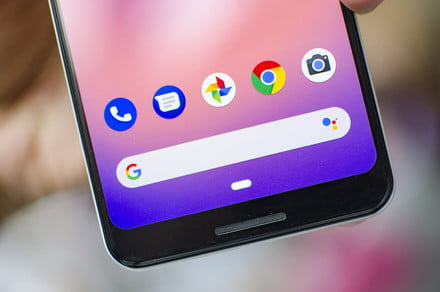Google’s back at it again. After launching and shutting down nearly half a dozen instant messaging apps, the company is taking yet another crack at filling the iMessage-sized hole in the Android ecosystem.
For the past year or two, Google has been working towards a fundamental solution to avoid running into the same obstacles which have ailed its previous messaging attempts. On Thursday, Google marked its first milestone as it began rolling out an update to enable a service called RCS chat on its default SMS app in the United States.
I’ll spare you from a technical lesson, but here’s the gist of it: You can think of RCS — short for Rich Communication Services — as a successor to the good ol’ SMS. It allows users to access the same set of instant messaging features such as high-quality media and read receipts on an SMS app.
So as long as both you and the recipient are on RCS-supported clients, you can chat over the internet as you would normally on, say, WhatsApp or Facebook Messenger. In case even one of you isn’t, the app will automatically fall back to SMS — similar to what iMessage offers. Google’s ultimate hope is that irrespective of what Android phone or SMS app you’re on, you should be able to text over RCS.
If it sounds all too convoluted, that’s because it is. Google’s RCS journey so far has been an eventful one, to say the least. You see, Google doesn’t own RCS. It’s an open protocol like SMS that has existed for about a decade. No one adopted it because people began using services such as Hangouts, Facebook, iMessage, or WhatsApp to chat for free and everyone sort of forgot about RCS.
Google picked up RCS because technically, it’s a powerful framework that can potentially be the answer to all of its messaging woes. For the RCS plan to truly work and replicate iMessage’s convenience, it has to exist on every Android phone. For that, Google needs network carriers as well as phone makers and that’s exactly what it’s trying to do for the last few years. Google has been hounding these companies to add RCS compatibility.
Unfortunately, Google failed and ended up going ahead without them. In a handful of countries including the United States, people can try RCS on the Android Messages app. Except it also may have ended up in a muddle bigger than it was already in.
The four major operators in the U.S. — AT&T, Verizon, T-Mobile, and Sprint — announced a joint venture to offer a new RCS-based messaging app by next year. While the association and Google (which seemed unaware of this at first) promise interoperability, there are so many details still hanging in the balance and moving parts that it’s entirely possible the RCS dream may never see the light of the day.
But is all that effort worth it and does Google even need RCS to combat iMessage?
In an ideal world where each company in question would have agreed on the same terms, RCS could succeed. However, that’s barely the case here.
Plus, even if Google does manage to bring everyone on the same page, messages sent over RCS won’t be end-to-end encrypted. That compromise gets worse when you consider how RCS channels data.
Each RCS service provider has to maintain its own, separate servers that are tasked to route incoming and outgoing messages to their right (possibly another server) destination. For instance, a message from Android Messages to a Samsung SMS app will have to go through two servers. This setup leaves a lot of room for anyone to snoop on your data. Mobile carriers especially have a crummy history in terms of encryption and pushing back against governments which coerce them for private user information.
RCS hinges on way too many “maybes” to ever take off.
More importantly, Google has a better chance of taking on iMessage with a straightforward instant messaging integration inside its SMS app. A few other companies like Truecaller and Facebook have managed to do that in the past — albeit not at the same scale Google is aiming for.
Over a year ago, Truecaller flipped an IM switch for the SMS tab on its caller ID app. When the app detects the recipient is on Truecaller as well, you can use the usual IM tools. Otherwise, the app sends a normal SMS message. It works seamlessly and it’s the closest anyone has ever gotten to offering an iMessage-like experience on Android.
I’m not saying Google should develop another instant messaging app with this concept, but Google should develop another instant messaging app with this concept. It did sort of try to merge SMS and IM way back during the Hangout days. However, it was far from perfect and didn’t work as intended most of the time.
Fragmentation, which has been the primary cause of distress for Google’s past IM efforts, will likely be one of the biggest obstacles once again. Although it will still be better than the RCS mess Google is in right now.

